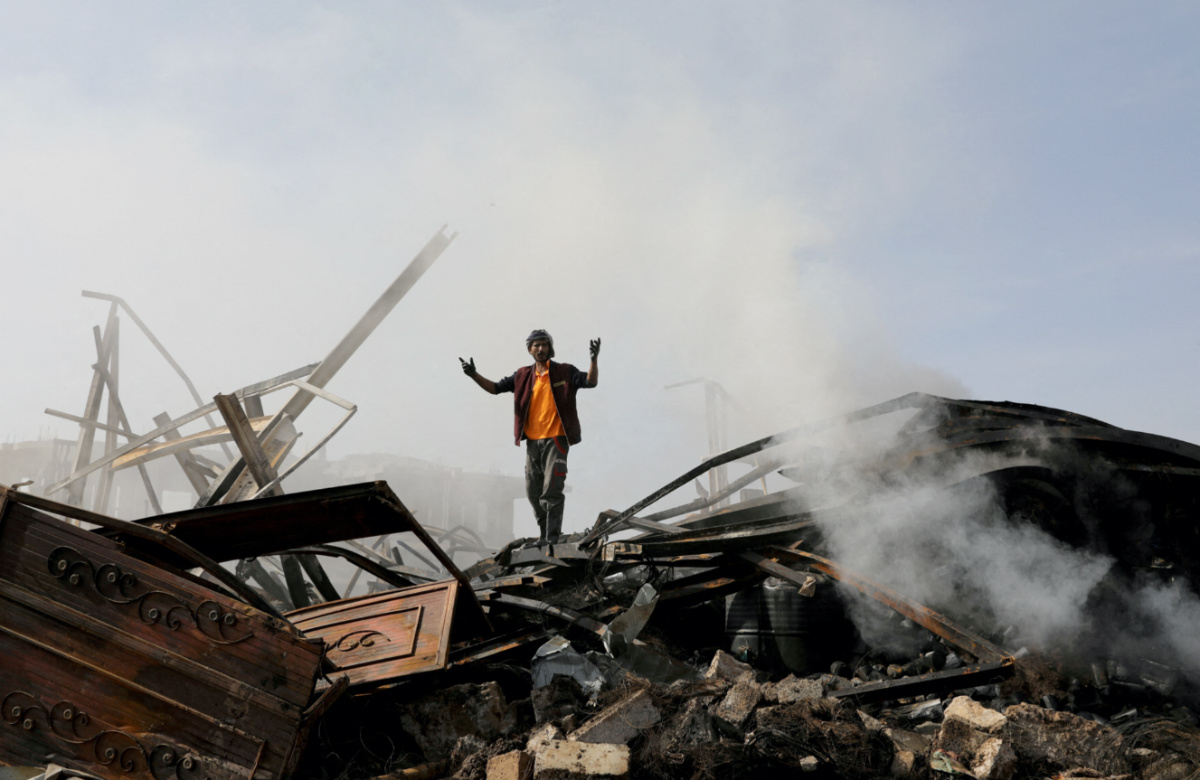Aden, Yemen
Reuters
The warring sides in Yemen’s seven-year conflict have for the first time in years agreed a nationwide truce, which would also allow fuel imports into Houthi-held areas and some flights operating from Sana’a airport, the UN envoy said on Friday.
The UN-brokered deal between a Saudi-led coalition and the Houthi group aligned with Iran is the most significant step yet towards ending a conflict that has killed tens of thousands and pushed millions into hunger. The last coordinated cessation of hostilities nationwide was during peace talks in 2016.

A worker reacts as he stands on the wreckage of a vehicle oil and tires store hit by Saudi-led air strikes, in Sanaa, Yemen on 2nd July, 2020. PICTURE: Reuters/Khaled Abdullah//File photo.
UN special envoy Hans Grundberg said the two-month truce would come into effect on Saturday at 7pm local time and could be renewed with consent of the parties. Saturday marks the start of the Muslim holy month of Ramadan.
“The aim of this Truce is to give Yemenis a necessary break from violence, relief from the humanitarian suffering and most importantly hope that an end to this conflict is possible,” Grundberg said in a statement, adding he would press for a permanent ceasefire.
Yemen’s economy and basic services including health have collapsed, leaving 80 per cent of the population of around 30 million reliant on aid.
UN Secretary-General Antonio Guterres said the truce “must be a first step to ending Yemen’s devastating war”, urging the parties to build on the opportunity to “resume an inclusive and comprehensive Yemeni political process”.
The deal stipulates halting offensive military operations, including cross-border attacks, and allowing fuel ships to enter Houthi-held Hodeidah port and commercial flights in and out of the airport in the capital, Sanaa, “to predetermined destinations in the region”.
Grundberg said the parties agreed to discuss opening roads in Taiz, effectively under siege, and other Yemeni regions.
Proxy conflict
The UN and US envoys had been trying since last year to engineer a permanent truce needed to revive stalled political negotiations. The Houthis wanted the coalition blockade lifted first, while the alliance sought a simultaneous deal.
The conflict is seen as a proxy war between Sunni Muslim Saudi Arabia and Shi’ite Iran. Riyadh has struggled to extricate itself and Yemen has been a point of tension with Washington.
The Houthis recently intensified missile and drones strikes on the kingdom, including its oil facilities, and the coalition ramped up air strikes.
The Yemeni government, which the Houthis ousted from Sanaa in late 2014, said earlier it would facilitate arrangements for release of prisoners, opening Sanaa airport and allowing fuel vessels into Hodeidah.
“We immediately announce the release of the first two fuel ships through Hodeidah port,” said Foreign Minister Ahmed Bin Mubarak.
We rely on our readers to fund Sight's work - become a financial supporter today!
For more information, head to our Subscriber's page.
Houthi chief negotiator Mohammed Abdulsalam welcomed the truce. Another senior official, Mohammed Ali al-Houthi, said its “credibility would be in implementation”.
A copy of the truce deal seen by Reuters, and reported by Houthi-run Al Masirah TV, said 18 fuel vessels would be given access during the truce period and two flights a week would be operated from Sanaa to Jordan and Egypt.
The Saudi-led coalition also welcomed on Friday the truce in Yemen saying it supports the UN efforts and arrangements to keep the deal, Saudi state TV reported.
The Saudi-led coalition, which intervened in March 2015 against the Houthis, controls Yemen’s seas and air space.
US President Joe Biden welcomed the truce but said it must be adhered to and he urged negotiators to “undertake the hard and necessary work” to reach an enduring peace.
The parties are also discussing a prisoner swap under which hundreds from both sides would be freed, including 16 Saudis, three Sudanese and a brother of Yemen’s President.
The last major prisoner swap, involving around 1,000 detainees, took place in 2020 as part of confidence-building steps agreed at the last peace talks held in December, 2018.
– AZIZ EL YAAKOUBI in Riyadh, Saudii Arabia, and MICHELLE NICHOLS.






